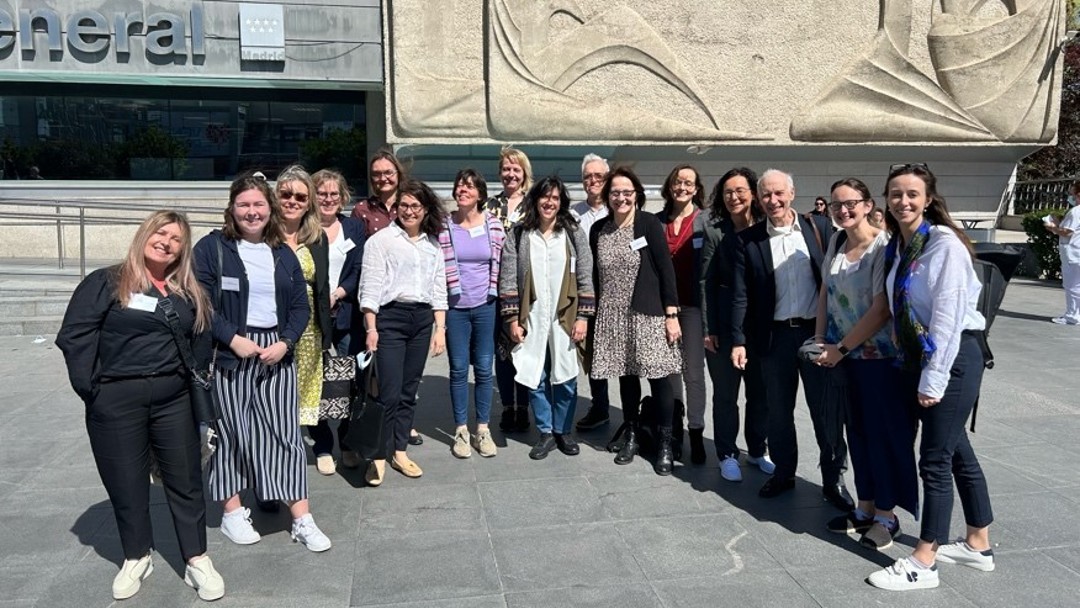For Necrotising Enterocolitis (NEC) awareness day 2023 (May 17), Anna Hulme and Sharon Donaghue teamed up to share their passion for raising awareness of this devastating condition that affects thousands of the most vulnerable premature babies and unwell term infants worldwide each year, and can also occasionally affect well-appearing term babies.
Anna is a recently qualified midwife working in University Hospital Wishaw maternity unit who campaigns for NEC awareness for personal reasons that she is keen to share with us in the hope more people will understand the long-term impacts of this very challenging condition.
Sharon is a newly qualified nurse in University Hospital Wishaw neonatal unit who has witnessed NEC in babies within the unit, and on her final nursing placement observed surgery on NEC patients. Sharon studied a degree in biological science just prior to starting nursing and is keen to explore what progress is being made into early NEC detection.
Necrotising enterocolitis (NEC) is a serious gastrointestinal disease that especially affects premature and low birth weight babies. The mortality rate of NEC is between 20%-30% with survivors often experiencing long-term complications such as short bowel syndrome and intestinal stenosis.
In NEC the immature gut becomes inflamed, and in severe cases necrotic (tissue death). The exact cause of NEC is not fully understood but is known to be multifactorial combining environmental, immune, genetic and microbiological factors.
NEC has been found to be more common in formula fed babies which is why, if mothers are unable to express sufficient breast milk or choose not to, donor expressed breast milk is made available to premature babies during their most vulnerable period. Breast milk contains antibodies which will help fight infection, and human milk oligosaccharides which are prebiotics that boost beneficial gut bacteria as well as the perfect balance of nutrients.
Sepsis can be common is new-borns, especially low birth weight babies, and this is known to increase the risk of NEC occurring. Reduced blood flow to the intestines can lead to inflammation and tissue damage creating the conditions for NEC to develop.
This combination can provide the perfect environment for an overgrowth of microorganisms such as anaerobic bacteria in areas where these bacteria are not usually found, causing further, often irreparable damage, to the intestines. At this stage, if antibiotics, gut rest, fluid management and sufficient oxygenation are not sufficient, the only option is surgery to remove diseased areas of the intestines.
For more information please visit- www.NECUK.org.uk
Anna’s story
Hi, my name is Anna. I am a survivor of Necrotising Enterocolitis – also known as NEC. I am a Midwife in University Hospital Wishaw’s Labour ward.
When I was born I appeared to be a healthy post-dates baby with only light forceps marks on my cheeks. I was always quite reluctant to feed, particularly at six hours old. My colour turned to grey and my abdomen distended, so I was rushed to the special care baby unit for antibiotics and X-rays to try and resolve the problem. Unfortunately, this did not work, as my bowel had perforated.
I was rushed to the city children’s hospital by ambulance whilst my mum remained in the postnatal ward and my dad followed in the car. I went straight to the operating theatre for emergency surgery where the affected part of my bowel was removed and an ileostomy (a stoma where part the small intestine is brought to the surface of the abdomen) was formed. I remained ventilated and placed in an incubator with a multitude of IV lines pumping drugs and fluids into me.
It is all a bit of a blur after this. I had many further surgeries including the placement of a gastrostomy (also known as a MIC-KEY button, a feeding tube that goes directly to the stomach), and multiple PICC lines for TPN. This ensured I gained the nutrients I required to grow as my bowel could not absorb so much anymore. The first year of my life was spent in the neonatal unit, then a paediatric ward before getting home just before my first birthday.
I have been in and out of my hospital throughout my life due to the long term complications of NEC. I live with Short Bowel Syndrome as I have less than half of my small bowel remaining and have lost almost my entire large bowel. My stoma was deemed permanent but at the age of 13 years I pleaded to try a reversal so that I could be ‘normal’.
This was followed by a difficult 10 years of pain and rushing to the bathroom, so after much deliberation I opted to have my stoma reformed permanently to allow me the best quality of life.
NEC hasn’t stopped me doing anything, much to the surprise of healthcare professionals and other onlookers. If anything, having my stoma has made me more determined with the support of my family and friends. I knew I always wanted to work in healthcare but at times it felt a long way off. I missed a lot of time from education due to illness but I decided to spend a further two years at school to give myself the best chances for the future.
I have always wanted to help others, I love caring for all of the women, babies and their families. I volunteer for NECUK as an adult survivor, and I am currently helping set up a peer support group for people with stomas in Scotland and their families.
I have been able to do so many great things during my life. I was nominated to carry the Olympic torch during the London 2012 Olympics. I have always enjoyed taking part in sport and have competed internationally in triathlons, and I have swum the English Channel twice as part of a relay team. I was also a member of the Royal Air Force Air Cadets where I was fortunate to have the opportunity to fly gliders and planes, and even travel the country for different events.
I love to travel and see the world. I have recently been to Madrid for a conference with the European Resource Network for rare inherited diseases and congenital abnormalities as a patient representative for Necrotising Enterocolitis. There, I took part in a project to improve the transition from paediatric health services to adult health services.
NEC is a rare disease but particularly rare in term babies. My story is very different to many others in a somewhat similar situation and this can be a challenge for the health service particularly moving into adulthood. I am very passionate about changing the future for other children and adults growing up with a rare disease or long term medical conditions through advocacy and research.
I hope to inspire other children and parents of babies overcoming illness by demonstrating what they can achieve in life. It sometimes takes a little bit longer, and you have to work harder, but it is most certainly worth it!
Signs and symptoms of NEC can be difficult to detect during the early stages. Vomiting, refusing to feed if at that stage, abdominal distension, bloody stools, tachycardia, low blood pressure, apnoea, desaturations, lethargy, green aspirates, and deranged blood samples are all signs that can become apparent in the neonatal unit, warranting further investigations such as abdominal x-ray and septic screen. Precautions such as stopping feeds, IV fluids and antibiotics are the next line of treatment when NEC is suspected. NEC will often show on an x-ray as distended small bowel loops.
During her first honours degree in biological science, human health at Heriot Watt university, Sharon studied a broad variety of subjects including medical microbiology, immunology, cell and molecular biology, pathophysiology and genetics. Although, as a nurse in the neonatal unit we quickly become aware of the early signs of NEC from an anatomy and physiology perspective, there will have been many changes within the body before these become apparent. Being able to detect NEC at earlier stages could save lives and improve long term outcomes for babies, and the children and adults they become.
As NEC is so multifactorial, research into cell and molecular biology of the condition is complex and time consuming. Ethical limitations in terms of human models and obtaining samples will also be problematic. However, advancements in areas such as the “omics”, improvements in ultrasound at the incubator side and consideration of the application of non-invasive technology such as NIRS are appearing in the academic literature.
Omics is a branch of research that looks for subtle changes in biomolecules or biomarkers such as metabolites and proteins from samples of blood, urine or stool. These can indicate that changes are occurring at a cellular level, which could give the basis for starting prophylactic treatments. Collaboration between neonatologists and biological scientists will promote NEC as a serious disease with devastating consequences that needs to remain a priority for omics research.
Near infra-red spectroscopy (NIRS) is more commonly used to measure tissue oxygenation in the brain. However, research has shown that NIRS can also be used as a non-invasive measure of intestinal tissue perfusion. As poor intestinal perfusion is a known factor in NEC development this could become an early warning intervention, using currently available technology and equipment, before any clinical signs become apparent.
Award winning teams such as Wishaw Neonatal Multidisciplinary team will continue to innovate and seek early interventions to reduce morbidity and mortality for these babies.



